The world of B2B enterprise ecommerce is evolving faster than ever.
As technology and buyer expectations shift, businesses must adapt to stay competitive.
But what will define the future of ecommerce for B2B marketplaces in 2025?
It’s more than just adopting the latest tools—it’s about embracing trends that reshape the way companies connect, sell, and grow.
From the rise of personalization to the increasing dominance of B2B marketplaces, the B2B ecommerce landscape is transforming.
Businesses are moving towards solutions that enable seamless scalability, faster operations, and deeper customer engagement.
Well, keeping up with these trends is essential for success.
Ready to discover what’s ahead and how your business can lead the way?
Table of Contents
- The Future of Ecommerce: B2B Trends And Industry Insights
- 10 Trends Reshaping B2B Enterprise Ecommerce In 2025
- 1. Hyper-Personalized Buyer Journeys
- 2. Mobile as the Primary Sales Channel
- 3. Headless Commerce for Innovative Flexibility
- 4. Omnichannel Commerce
- 5. Seamless Integrations
- 6. Multi-Vendor Marketplaces for Standardized Business Operations
- 7. Hybrid Business Models
- 8. Localized B2B Ecommerce Experiences
- 9. Subscription-Based Selling Models
- 10. Data-Driven Strategic Growth
- Conclusion
The Future of Ecommerce: B2B Trends And Industry Insights
The future of B2B ecommerce is rapidly evolving, driven by technological advancements and changing buyer behaviors. Understanding these ecommerce trends is crucial to staying ahead and thriving in the competitive ecommerce landscape.
Here is a quick look at the B2B trends and customer behavior:
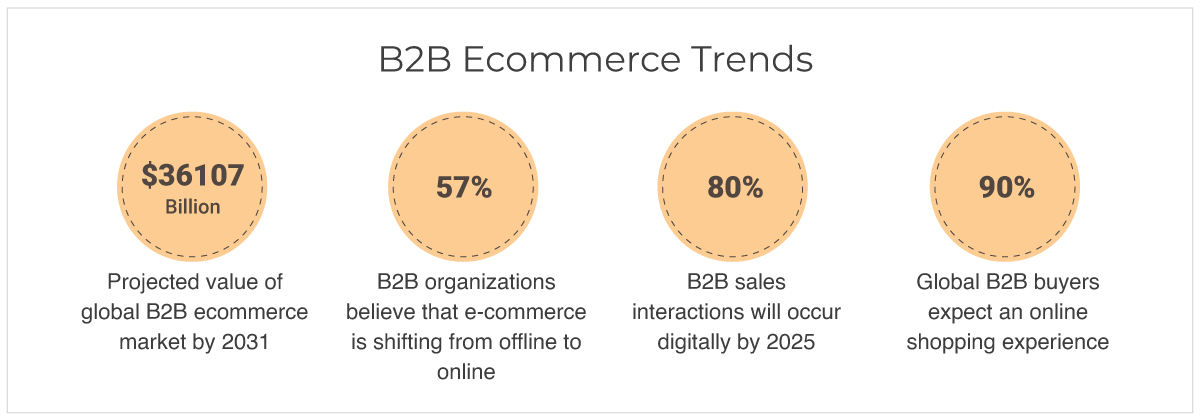
- $ 36,107.63 billion is the projected value of global B2B ecommerce market by 2031
- 57% of B2B organizations believe that e-commerce is shifting from offline to online
- 80% of all B2B sales interactions will occur digitally by 2025
- 90% of global B2B buyers expect an online shopping experience
Source: Statista
The B2B enterprise ecommerce landscape is evolving rapidly, shaped by technological innovations and changing buyer expectations. As businesses adapt, they must keep up with trends like the rise of digital interactions, the shift from offline to online sales, and the growing importance of seamless, online experiences for buyers.
10 Trends Reshaping B2B Enterprise Ecommerce In 2025
The future of ecommerce, in the B2B industry is defined by greater scalability, faster operations, and deeper customer engagement, making it essential for businesses to stay ahead of ecommerce trends to remain competitive. Understanding these trends is key to thriving in the ever-changing market.
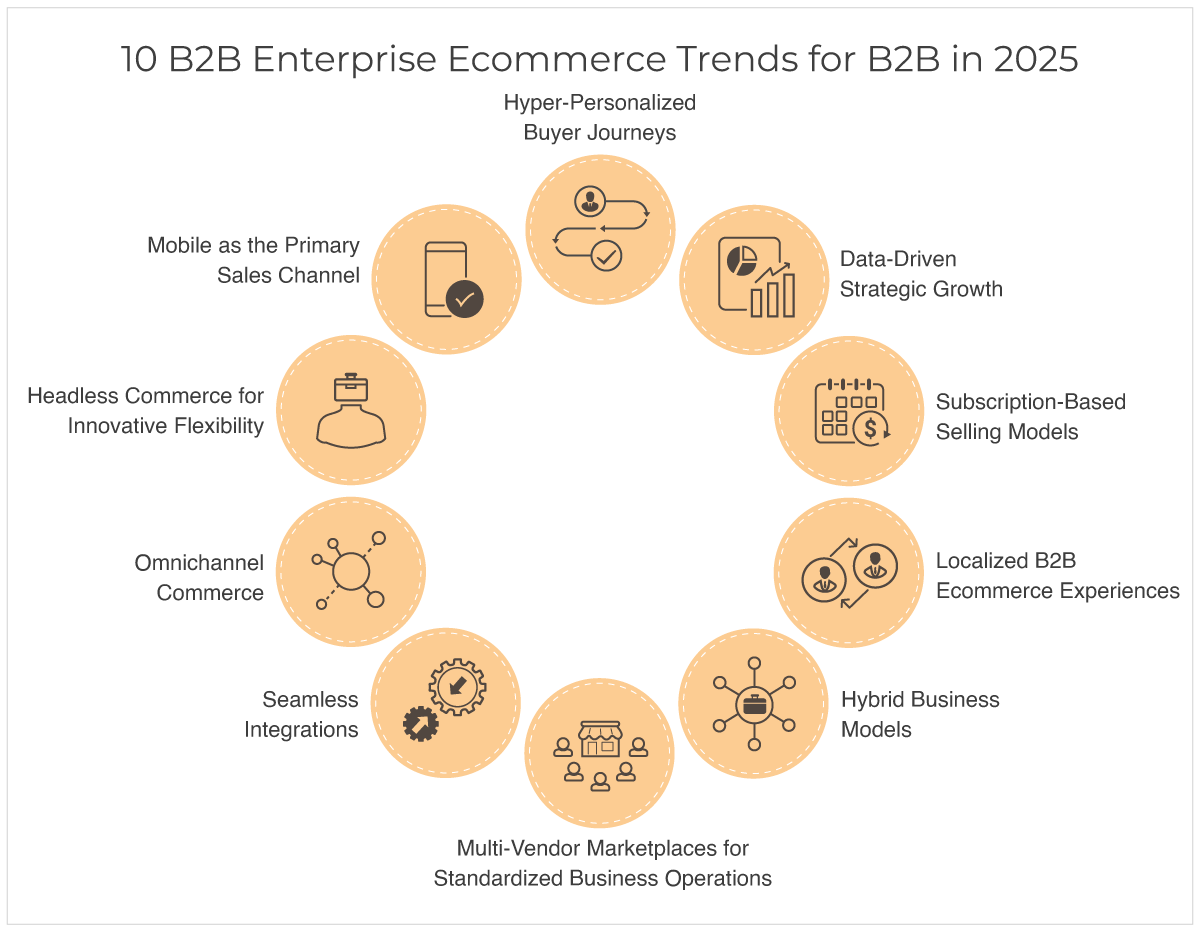
Here are 10 B2B ecommerce trends to watch in 2025:
1. Hyper-Personalized Buyer Journeys
In B2B ecommerce, personalization is no longer just a value addition—it’s a necessity. Buyers today expect tailored experiences that cater to their unique needs. From personalized catalogs and pricing to product recommendations, every touchpoint should align with the buyer’s preferences. This approach not only enhances engagement but also builds trust and loyalty. The future of ecommerce lies in creating hyper-personalized buyer journeys that adapt dynamically based on customer behavior and intent.
The flexible enterprise ecommerce platform StoreHippo is built on the decoupled headless architecture, that can be tweaked inside out. You can implement multi-level personalizations like building multiple storefronts/sub-stores for your B2B marketplace for different locations, audiences, or different categories. From customizing your shipping solutions and digital payments to offering localization with multilingual content and personalized pricing, different store designs, discounts, etc., you get a wide range of features and tools with StoreHippo.
2. Mobile as the Primary Sales Channel
With mobile devices becoming the preferred buying channel, mobile-first strategies are reshaping the ecommerce industry. Buyers increasingly rely on their smartphones to browse products, place orders, and track deliveries. You must ensure your platform is mobile-optimized, offering fast-loading pages, intuitive navigation, and mobile-friendly payment options. The future of ecommerce demands responsive designs that provide a seamless experience across all devices. By prioritizing mobile as the primary sales channel, you can cater to modern buyers who demand convenience and accessibility in their shopping journeys.
StoreHippo’s ecommerce platform is built on the mobile-first principle and offers a variety of mobile-ready solutions. Stores built on StoreHippo are PWAs, which means your ecommerce websites will work, look, and feel like mobile apps. StoreHippo’s inbuilt mobile apps builder builds mobile apps right from the admin dashboard at zero additional costs without any coding. You can easily create separate apps for different sub-stores from the admin dashboard. StoreHippo enterprise ecommerce solutions also offer a variety of apps for admins, vendors, delivery boys, etc. making it easy for brands to run their business on the go.
3. Headless Commerce for Innovative Flexibility
The shift towards headless commerce is a game-changer for B2B enterprises seeking flexibility and innovation. Unlike traditional systems, headless architecture decouples the front end from the back end, allowing you to deliver tailored experiences across multiple touchpoints. This flexibility empowers you to experiment with unique storefronts and other emerging trends without disrupting operations. It’s particularly beneficial for B2B marketplaces, where diverse user needs demand customizable and scalable solutions.
The decoupled headless architecture from StoreHippo gives your marketing and development teams better creative control and agility to implement out of box solutions. With StoreHippo’s headless enterprise ecommerce solution and 300+ API endpoints, you can integrate the best software and services to build your tailored ecommerce environment for your customers.
4. Omnichannel Commerce
B2B buyers today expect a seamless journey across multiple channels, from online stores to physical locations. Omnichannel commerce bridges the gap by integrating these channels into a cohesive experience. Whether a buyer is researching a product on a mobile app, ordering through a web portal, or interacting with a sales rep, the shopping experience across all devices should be effortless. The future of ecommerce thrives on consistency, and omnichannel strategies ensure that businesses meet buyers wherever they are.
StoreHippo ecommerce platform comes with an intuitive omnichannel solution that helps you add new customer touchpoints using the same backend logic and APIs. You can create consistent buyer experiences across multiple channels to boost engagement on your marketplace. You can also offer a personalized shopping experience to your customers on all the sales channels and centrally control them from a common admin dashboard. StoreHippo also offers 300+ API endpoints that enable seamless integrations with best-in-breed tools to create unforgettable omnichannel buying experiences.
5. Seamless Integrations
For B2B enterprise ecommerce businesses, seamless integrations are the backbone of operational efficiency. You need a host of tools such as CRMs, ERPs, and payment gateways to manage your business operations, ensuring smooth data flow, real-time updates, and minimized errors. With seamless integrations, Your business processes such as inventory management and order processing become more streamlined, leading to better customer experiences. To navigate the future of ecommerce, seamless integrations are essential in a rapidly evolving landscape.
StoreHippo offers seamless integrations with your choice of software to build innovative solutions using headless APIs. You can manage your business by seamlessly integrating your B2B marketplace with software like CRM, ERP, accounting, and so on. You can integrate with multiple delivery partners, payment channels, chatbots, live chat, etc. StoreHippo comes with 120+ built-in integrations and integrates easily with the preferred software and service providers of enterprise marketplace brands. With its integrated logistics and payment gateways StoreHippo makes it easier for brands to implement faster checkouts and streamlined fulfillment.
6. Multi-Vendor Marketplaces for Standardized Business Operations
Multi-vendor marketplaces are transforming how B2B enterprise ecommerce businesses streamline their operations. A multi vendor marketplace brings multiple sellers under one roof, offering your buyers a diverse product range while standardizing business processes like invoicing, shipping, and returns. By leveraging this model, you can scale rapidly and adapt to changing market demands offering a wide product catalouge to your customers. For B2B businesses, multi-vendor marketplaces represent a practical solution for managing complex supply chains and expanding market reach.
StoreHippo offers a comprehensive admin dashboard that reflects the overview of everyday business activities and vendor performance. The admin can access the fine details of your B2B enterprise ecommerce business like vendor-specific sales, revenue, best-selling products, etc. from the admin dashboard of their marketplace website. The marketplace admin also has the power to add, approve, or reject vendors and their products, view complete vendor details, calculate their commission and payouts, and analyze the performance of the vendor, their sales, etc.
7. Hybrid Business Models
Hybrid business models combining B2B and B2C strategies, hyperlocal business models, etc are gaining traction as enterprises look to diversify their revenue streams. These models allow you to cater to wholesalers as well as direct consumers through a unified platform. By blending bulk ordering capabilities with personalized shopping experiences, B2B marketplaces can maximize their reach and profitability. Hybrid business models help you efficiently serve multiple customer segments and adopt a hybrid approach that ensures flexibility and resilience in an ever-changing market environment.
StoreHippo offers a fully hosted and managed enterprise ecommerce platform with built-in solutions to create disruptive hybrid business models. With battle-tested solutions for B2B, B2C, D2C, B2B2C, Quick commerce, and other hybrid business models StoreHippo enables B2B enterprise brands to go to market in record time. Switching or combining any new business model with their existing model is also easy with StoreHippo’s inherent flexibility and adaptability.
8. Localized B2B Ecommerce Experiences
The future of ecommerce lies in localization, amplifying the need for localized ecommerce experiences in B2B markets. Customers prefer platforms that cater to their language, currency, and cultural preferences. Localization also involves tailoring product offerings, payment methods, and marketing strategies to resonate with specific markets and the target audience. Offering localized experiences plays a crucial role in building trust and fostering customer loyalty. For businesses operating in a B2B industry, prioritizing localization is a strategic move to capture diverse market opportunities.
StoreHippo comes with a host of in-built marketing tools like a powerful discount engine that enables the brand to offer multi-level discounts based on the product, vendors, or customer’s order value, location, etc. You can also offer personalized product recommendations based on your user’s order history and other demographics. With StoreHippo you can also personalize your web, push or mobile notifications about the latest arrivals, discounts, etc based on your customers’ preferences. To create a localized look, and feel on your B2B marketplace, you can seamlessly translate your marketplace in 100+ languages including right-to-left language with multilingual support from StoreHippo.
9. Subscription-Based Selling Models
Subscription-based models are becoming essential in B2B enterprise ecommerce, offering predictable revenue streams and strengthening client relationships. By refilling supply needs, the subscription model for B2B ecommerce enable businesses to establish long-term partnerships with retailers, distributors and resellers of a variety of goods like FMCG products, industrial goods, lubricants, ink and printing material, clothes and apparel, disinfectants for hospitals and many more items. By delivering a curated selection of products or services regularly, enterprises offer convenience and reliability. Tailored subscription plans aligned with client-specific requirements further enhance engagement, demonstrating a deep understanding of their business needs.
StoreHippo offers the provision of subscription-based products to capture more recurring orders. You can sell products and services with recurring payments once the customer opts for this.
When you create a B2B marketplace with StoreHippo, you can automate the flow of orders, and create and manage products with recurring payments. You also have the provision to choose the packages for the subscription for your users. You can provide them with a subscription for days, weeks, months, and years.
10. Data-Driven Strategic Growth
Data is the driving force behind strategic decision-making in B2B enterprise ecommerce. By leveraging analytics, you can gain insights into buyer behavior, market trends, and operational efficiency. This data-driven approach enables proactive engagement, better inventory management, and refined marketing strategies. For businesses operating in a B2B landscape, data analysis can lead to smarter, more agile growth strategies, ensuring sustained success. You therefore need solutions that offer robust analytics and rich customer insights at your fingertips.
StoreHippo comes with a gamut of marketing tools and analytical solutions to help you analyze your customer segmentation and make data-centric marketing plans for business growth. You can create personalized landing pages, and custom forms using the built-in form builder and capture rich customer data. With StoreHippo enterprise ecommerce solutions, you can also seamlessly integrate with several data tools like Google Analytics, Zoho, etc. that provide rich customer data. The gamut of marketing tools from StoreHippo like email, push notifications, SEO tools, data analytics, etc help you to drive sales on your beauty marketplace.
Conclusion
The B2B enterprise ecommerce landscape in 2025 is set to be defined by groundbreaking trends, from hyper-personalization and headless commerce to omnichannel strategies and subscription-based models. Embracing these trends is essential for businesses aiming to thrive in a competitive, digital-first market.
You can seamlessly leverage the flexible and scalable platform StoreHippo with 300+ enterprise-grade features and 120+ built-in integrations to future-proof your business and stay ahead of the curve. StoreHippo is a 360-degree robust enterprise ecommerce solution that helps you carve a niche for your brand in the B2B ecommerce market, and succeed in staying relevant, proactive, and customer-centric.
Are you ready to embrace the B2B enterprise ecommerce trends on your marketplace? Explore StoreHippo by starting your 14-day free trial now.
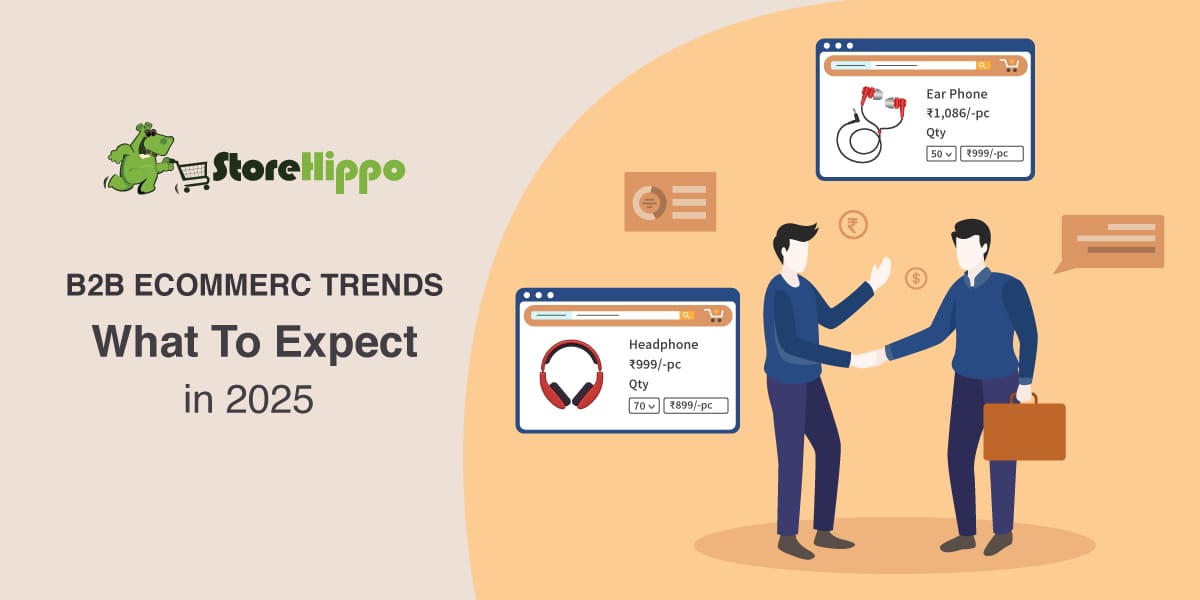















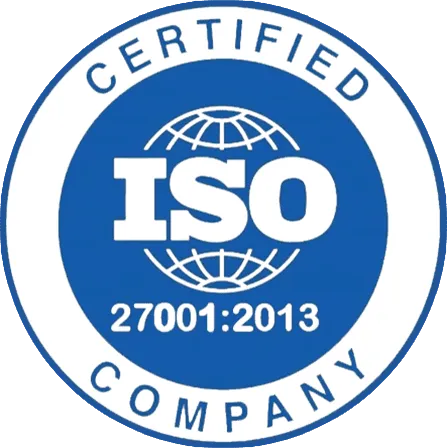



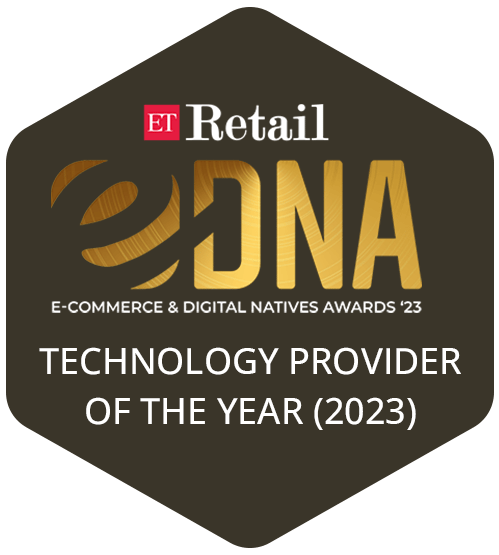
Leave A Comment